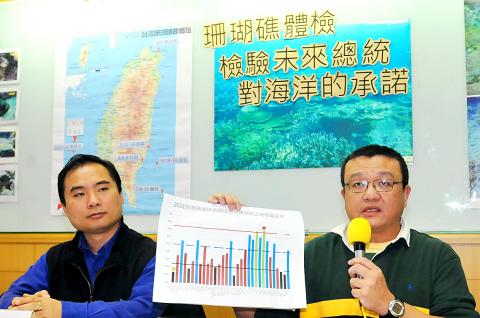Following three years of studies on the health of Taiwan’s coral reefs, the non-profit Taiwan Environmental Information Association yesterday said the ocean ecology surrounding Taiwan was threatened by overfishing and urged the three presidential candidates to enforce ocean protection policies.
The association said that from studies on the health of Taiwan’s coral reefs done by association volunteers beginning in 2009, it discovered that aside from the condition of coral reefs, a rapid exhaustion of fish in coral reef habitats was common.
Global Coral Reef Monitoring Network East Asia planning director and Penghu Symbiotic Algae Association chairperson Allen Chen (陳昭倫) said indicator fish species and invertebrate species that are edible, such as sweetlips, lobsters and sea urchins, are very scarce, a sign of exhaustion of marine resources caused by overfishing.

Photo: CNA
“Almost all the edible fish resources in these areas have been caught,” he said, adding that based on data provided by the Council of Agriculture’s Fishery Agency, the annual catch from coastal fisheries last year had dropped 42.69 percent in comparison with the catch in 2001, with a 19.75 percent drop in offshore fisheries.
He said that although the coral cover, the proportion of reef surface covered by live stony coral, over the seven surveyed sites varied, with Green Island (綠島) presenting the highest cover rate, the overall condition was considered “medium,” according to the Reef Check Worldwide organization’s standards.
The association said an agreement was reached at an international conference in 2003, held by the International Union Conservation of Nature, promising to set aside 12 percent of oceans worldwide as marine reserves, but currently less than 6 percent of Taiwan’s ocean area is protected by regulations.
Taiwan Environmental Information Association secretary-general Chen Juei-pin (陳瑞賓) urged the government and the three presidential candidates to set up marine reserves to ensure the sustainable development of the ocean, improve ocean protection and to push for tougher regulations.
He also said the association had sent a letter to all three presidential candidates on Wednesday urging them to recognize the importance of ocean protection, but that so far there have not been any replies.
“We can wait for their replies, but marine life cannot wait anymore. So we hope the government can give us answers as soon as possible,” he said, adding that the association would continue to monitor whether ocean protection policies are being enforced after the Jan. 14 elections.

Alain Robert, known as the "French Spider-Man," praised Alex Honnold as exceptionally well-prepared after the US climber completed a free solo ascent of Taipei 101 yesterday. Robert said Honnold's ascent of the 508m-tall skyscraper in just more than one-and-a-half hours without using safety ropes or equipment was a remarkable achievement. "This is my life," he said in an interview conducted in French, adding that he liked the feeling of being "on the edge of danger." The 63-year-old Frenchman climbed Taipei 101 using ropes in December 2004, taking about four hours to reach the top. On a one-to-10 scale of difficulty, Robert said Taipei 101

Taiwanese and US defense groups are collaborating to introduce deployable, semi-autonomous manufacturing systems for drones and components in a boost to the nation’s supply chain resilience. Taiwan’s G-Tech Optroelectronics Corp subsidiary GTOC and the US’ Aerkomm Inc on Friday announced an agreement with fellow US-based Firestorm Lab to adopt the latter’s xCell, a technology featuring 3D printers fitted in 6.1m container units. The systems enable aerial platforms and parts to be produced in high volumes from dispersed nodes capable of rapid redeployment, to minimize the risk of enemy strikes and to meet field requirements, they said. Firestorm chief technology officer Ian Muceus said

MORE FALL: An investigation into one of Xi’s key cronies, part of a broader ‘anti-corruption’ drive, indicates that he might have a deep distrust in the military, an expert said China’s latest military purge underscores systemic risks in its shift from collective leadership to sole rule under Chinese President Xi Jinping (習近平), and could disrupt its chain of command and military capabilities, a national security official said yesterday. If decisionmaking within the Chinese Communist Party has become “irrational” under one-man rule, the Taiwan Strait and the regional situation must be approached with extreme caution, given unforeseen risks, they added. The anonymous official made the remarks as China’s Central Military Commission Vice Chairman Zhang Youxia (張又俠) and Joint Staff Department Chief of Staff Liu Zhenli (劉振立) were reportedly being investigated for suspected “serious

American climber Alex Honnold is to attempt a free climb of Taipei 101 today at 9am, with traffic closures around the skyscraper. To accommodate the climb attempt and filming, the Taipei Department of Transportation said traffic controls would be enforced around the Taipei 101 area. If weather conditions delay the climb, the restrictions would be pushed back to tomorrow. Traffic controls would be in place today from 7am to 11am around the Taipei 101 area, the department said. Songzhi Road would be fully closed in both directions between Songlian Road and Xinyi Road Sec 5, it said, adding that bidirectional traffic controls would